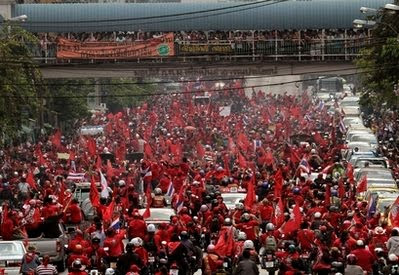Anti- government protesters march in Bangkok, Thailand, on Saturday March 20, 2010. Protesters in more than 1,000 vehicles set off Saturday for a daylong caravan through the streets of the Thai capital, hoping to enlist residents in their 'class war' against the government. (AP Photo/Sakchai Lalit)
via CAAI News Media
By THANYARAT DOKSONE, Associated Press Writer
BANGKOK – Tens of thousands of protesters riding motorcycles and crammed into trucks and cars rolled through the streets of the Thai capital Saturday in a giant caravan to rally residents to their "class war" against the government.
The "Red Shirt" protesters plan to follow up the march with a giant painting made from their own blood on Sunday, the latest shock tactic in their weeklong campaign to oust the government of Prime Minister Abhisit Vejjajiva.
The caravan stretched at least six miles (10 kilometers) along Bangkok's streets, and Metropolitan Police commander Vichai Sangparpai estimated the number of participants at 100,000.
Large crowds cheered the procession from the sidewalks as it passed with red flags and ribbons fluttering and car horns honking. Some motorcyclists plastered their license plates with stickers reading "The Red Shirts love Bangkok people."
"Please come out into the streets to change Thailand. Time waits for no one. No matter what color of shirt you wear — it doesn't have to be red — you can join our cause if you love equality and democracy," a protest leader, Natthawut Saikua, said as onlookers showered him with red roses.
The caravan included rural pickup trucks, taxis, minibuses, luxury sedans and Bangkok's iconic three-wheeled "tuk-tuks."
The protesters want Abhisit, whom they accuse of taking power through illegitimate means, to dissolve Parliament and call new elections — a demand he has repeatedly rejected. Abhisit has been sleeping and working at an army base for the past week to avoid the demonstrators.
The protesters planned a 40-mile (70-kilometer) loop through Bangkok, setting off from their encampment in the historic center of the city and driving through the central business district, Chinatown and outlying residential areas.
Protest leaders have increasingly portrayed the weeklong demonstrations as a struggle between Thailand's impoverished, mainly rural masses and a Bangkok-based elite impervious to their plight.
Dusting off vocabulary last used during the era of absolute monarchy that ended in 1932, the Red Shirts describe their struggle as one between "phrai," the common people, and "amataya," upper class bureaucrats and other members of the elite.
The group largely consists of supporters of former Prime Minister Thaksin Shinawatra, who was ousted by a 2006 military coup for alleged corruption, and pro-democracy activists who opposed the army takeover.
Thaksin is popular among the rural poor for his populist policies. They believe Abhisit came to power illegitimately with the connivance of the military and other parts of the traditional ruling class and that only new elections can restore integrity to Thai democracy.
About 100,000 people protested in the capital last Sunday, but the numbers fell by as much as half during the work week.
On Tuesday, thousands of Red Shirts donated blood to dramatize their demands, with leaders claiming they collected 80 gallons (300,000 cubic centimeters).
Most of the blood was splattered at Abhisit's office, at the headquarters of his ruling party and at his private residence.
Protest leaders say they have 15 jugs of blood left and plan to use it to create a massive work of art.
"Artists and Red Shirts will be invited to partake in a blood painting," said a protest leader, Jatuporn Prompan. They plan to unfurl a giant white cloth on which supporters will be invited to paint pictures, scrawl poems and express political statements.
"The theme of this artwork will be the history of the people's fight for democracy," Jatuporn said.
Thaksin, in a video linkup Friday evening, urged Bangkok residents to back the caravan.
"Fellow Bangkokians, send any kind of signals, wave a red flag, give some water, so that our Red Shirts can feel at ease," he said.
"I apologize for the traffic congestion lately and there will be more traffic jams when we march. I apologize. I owe you one. When I return, (I promise) 10 electric train lines from Bangkok to the surrounding provinces," he said.
Thaksin, who faces a two-year jail sentence for abuse of power, was reportedly in Dubai, his base in exile despite Thai government efforts to have the United Arab Emirates expel him.
In Bangkok, the protests have sparked a gamut of reactions from zealous support to anger at "peasants" coming to disrupt people's lives. A substantial number of people appear to be simply fed up with several years of protests by both pro- and anti-Thaksin forces that have undermined the country's economy and stability.

No comments:
Post a Comment